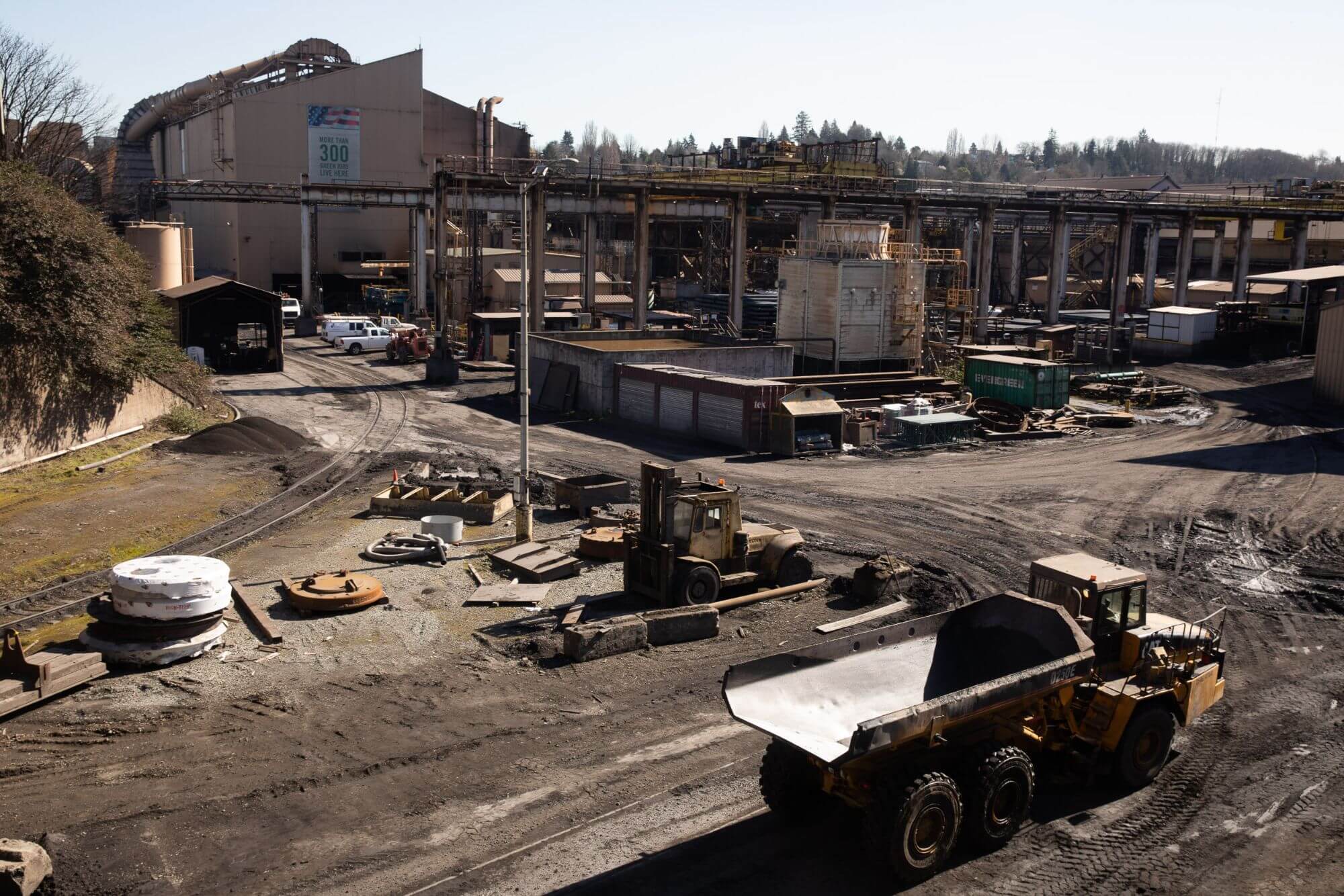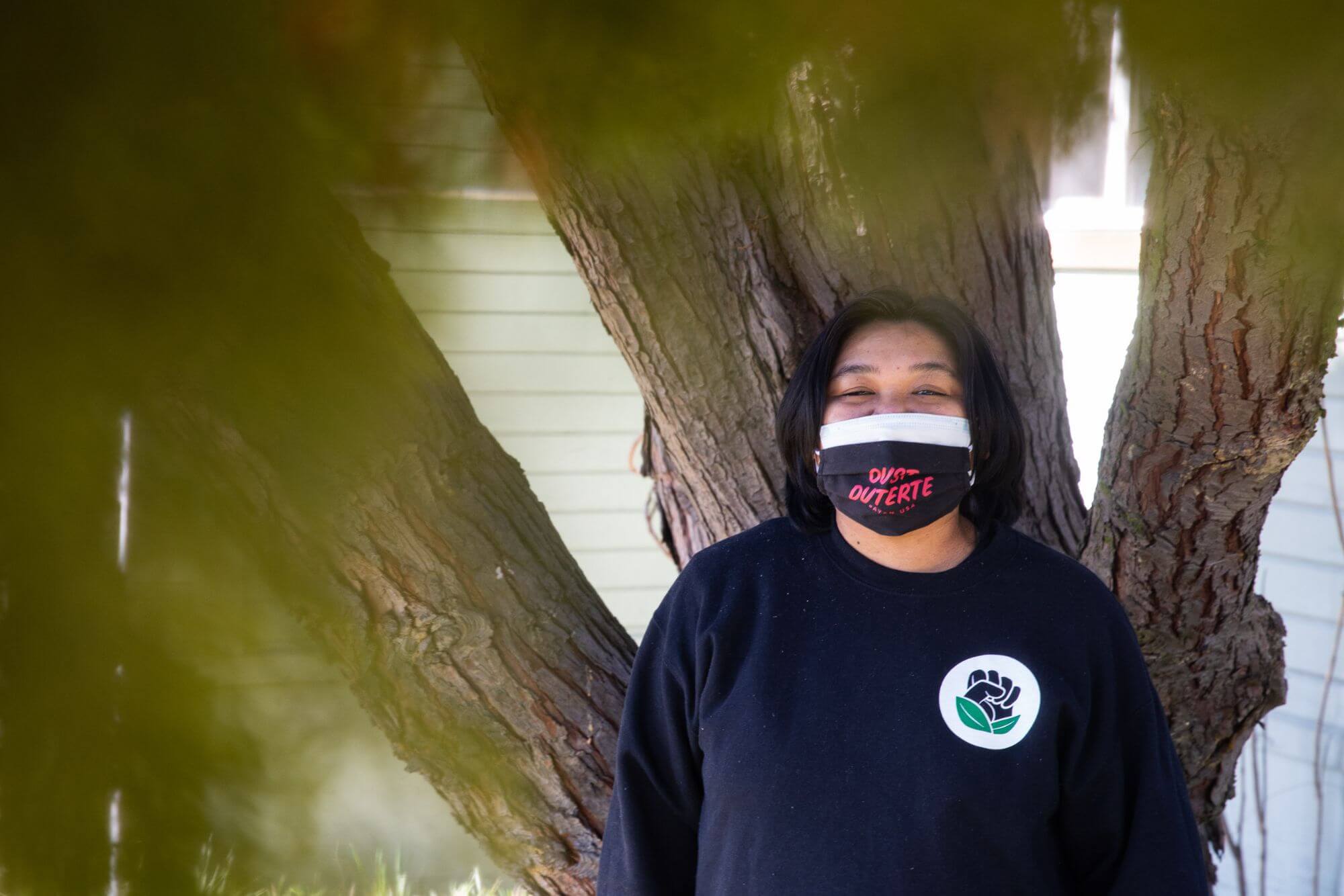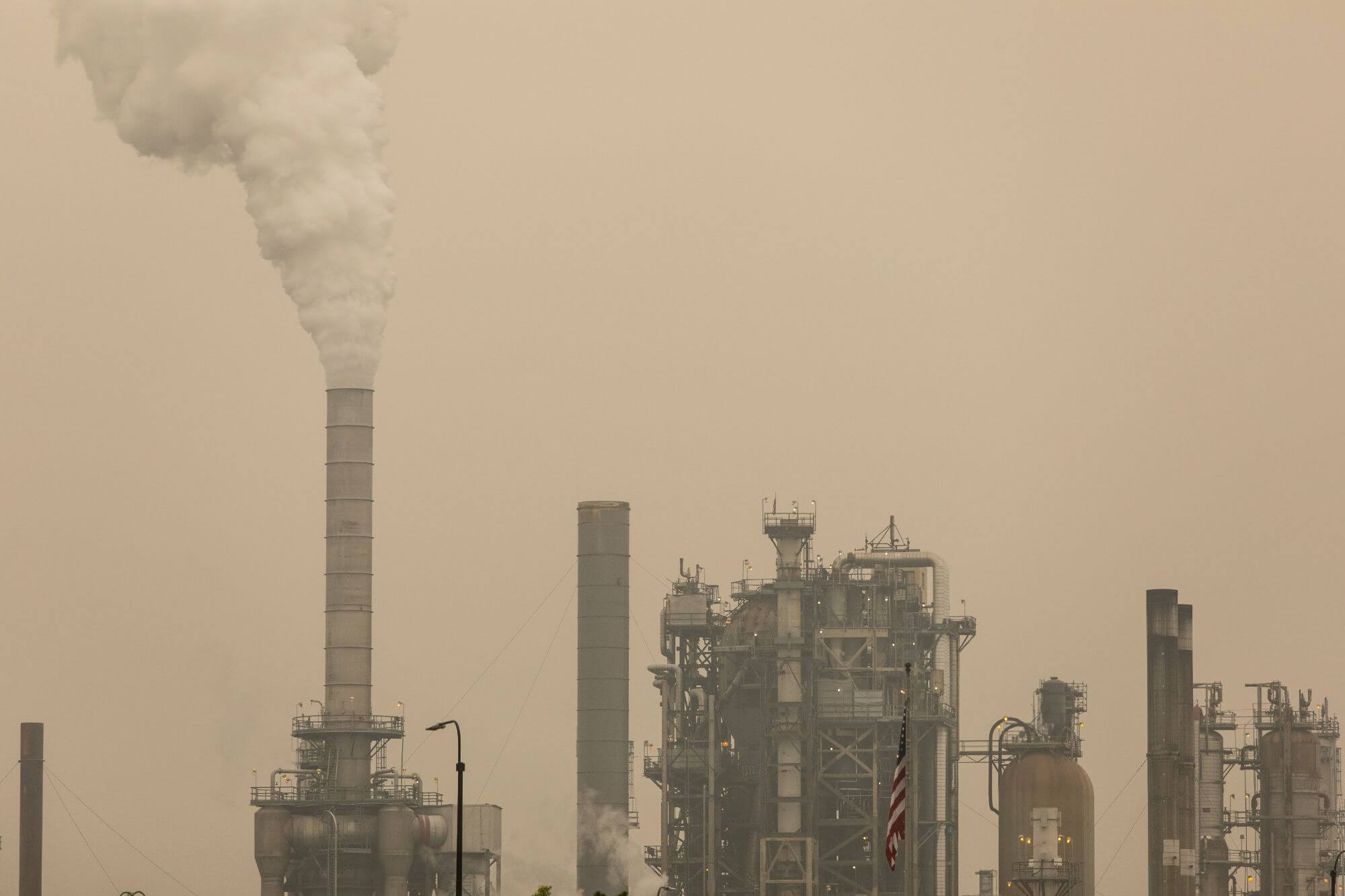Competing efforts to enact landmark climate-change legislation have fractured the state’s environmental coalition and Olympia’s all-powerful Democratic caucus, with some activists arguing that the proposal pushed by Gov. Jay Inslee shortchanges minority and low-income communities.
Questions of equity and trust have prompted a prominent environmental-justice coalition to oppose a cap-and-trade bill requested by Inslee. The Washington Climate Commitment Act, which would create a greenhouse gas market in Washington similar to one in California, is supported by the state’s most influential environmental groups, as well as fossil-fuel giant BP, operator of the state’s largest oil refinery.
Critics of cap-and-trade have rallied around a competing proposal, Washington STRONG, which would enact a tax on greenhouse gases emitted by the largest polluters.
Each bill would drive billions of dollars into state coffers, a key consideration as the Legislature tries to balance the books in the midst of the pandemic and following a voter repeal of car tab fees. But whether either will become law is unknown: with just more than six weeks left in the legislative session, neither has proceeded very far.

State Sen. Reuven Carlyle is the biggest legislative backer of the plan to control greenhouse gases being pushed by Gov. Jay Inslee and leading environmental groups, but opposed by a racially diverse coalition of grassroots environmental groups.
Although hundreds of Washington STRONG supporters signed on to push for it at a March 4 hearing before the Senate Committee on Environment, Energy & Technology, it’s unclear whether the committee will ever vote on the bill, Senate Bill 5373. Sen. Reuven Carlyle, the Seattle Democrat who chairs the committee and could call a vote, is the prime sponsor of the Climate Commitment Act, Senate Bill 5126.
Environmentalists arguing for and against both proposals agree on one point: Washington is running out of time to successfully address climate change. And in some cases, influential environmental groups like the Washington Environmental Council now back both bills.
“You need to put a limit that’s real on carbon, and a timeline that’s real,” said Rosalinda Guillen, a longtime farmworkers rights advocate living in La Conner. “We don’t have any more time.”
Guillen, who is active in the racially diverse coalition opposing the Climate Commitment Act, asserts that “cap-and-trade systems allow corporations to pay to pollute. They hate to hear it, but that’s what it is.”
But if the state’s climate coalition is split on cap-and-trade, opposition to carbon pricing from Republicans, who are entirely out of power in Olympia, remains firm. They are quick to point out how much the Climate Commitment Act would expand the reach of state government.
Sen. Doug Ericksen of Ferndale described the bill as “one of the biggest pieces of legislation we’ve seen in the Legislature, with one of the broadest grants of authority to the Department of Ecology we’ve seen in a long time.”
‘Fierce urgency’ but division
Setting a price on carbon pollution is widely viewed as a key step toward curbing emissions in time to avoid environmental catastrophe. A carbon price raises the cost of polluting, making cleaner power or technologies more competitive while generating tax revenue that can be used to prevent or respond to climate change.
Cap-and-trade systems and carbon taxes both set a price on carbon, but in different ways.
A cap-and-trade system breaks the total amount of allowable carbon pollution into one-ton pieces that are auctioned off to carbon dioxide emitters, creating a market for carbon credits that can be sold to industries in other states or nations. The price of pollution credits rises as the total number of credits is reduced and the amount of pollution declines.
Most systems, including the one proposed in Washington, would also allow companies to make up for a portion of their pollution by planting trees or taking other actions that pull carbon out of the atmosphere.
A carbon tax is more straightforward. The government sets a per-ton fee on carbon emissions and collects revenue from the polluters – although it exempts industries least able to manage the increased cost. While a tax doesn’t cap carbon pollution, supporters contend the cost of the tax, which increases each year, would drive down emissions. Emissions also could be restrained directly through regulation, a path preferred by some who support carbon taxes.
“SB 5126: The Washington Climate Commitment Act, aka “the cap-and-trade bill”
- Requires large polluters to participate in a state market to buy credits for each ton of carbon dioxide they release. The number of credits diminishes each year in line with the state’s emissions goals, tightening the market and raising the price of pollution.
- Revenue generated by the system, estimated at more than $500 million in the market’s first year of operation in 2023, would be split between a transportation fund and a climate resiliency fund.
- Washington carbon prices would ultimately track with California’s market, where credits sell at about $17 a ton.
While there’s disagreement on the cap-and-trade bill, Alyssa Macy, CEO of Washington Environmental Council and Washington Conservation Voters, said focusing on that difference ignores “vast areas of agreement and collaboration” on a host of issues, including landmark environmental justice legislation currently moving through the Legislature.
“Carbon pricing is dynamic and challenging but we desperately need an approach that invests in critical solutions for transportation, land use, and community input,” Macy said by email. “Whichever policy ultimately passes must live up to the spirit of reducing climate pollution in a way that will benefit overburdened communities and tribal nations.”
Opposition from Guillen and a racially diverse collection of environmental justice activists is a marked change from three years ago, when they joined with influential, predominately white environmental organizations to put a carbon tax on the ballot. That 2018 initiative failed. Now, Carlyle and other supporters of the Climate Commitment Act view it as Washington’s best chance to put a price on carbon emissions.
“The fierce urgency of climate action compels us to find a path forward,” Carlyle said during a February hearing. “In the past few years, there have been two statewide ballot initiatives and multiple carbon-pricing bills in the Legislature that have been unsuccessful. I believe the answer is this very bill.”
Carlyle described the Climate Commitment Act in historic terms, calling the bill “an opportunity to show our grandchildren’s grandchildren that we met the moment.”
As passed on Feb. 25 in Carlyle’s committee, the legislation would launch a cap-and-trade program in 2023. Initially, about 96 facilities would be regulated, with a broader swath of Washington’s larger greenhouse gas emitters falling under the system’s authority in 2027.
In all, the 96 facilities on the initial list now generate about 54 million metric tons of carbon dioxide annually, about 56% of the total statewide emissions, according to a Department of Ecology analysis provided to the Legislature. For context, the state must cut its total emissions by 54 million metric tons in the next nine years to hit its 2030 goal of bringing carbon dioxide emissions to 45% below 1990 levels.
Like cap-and-trade systems in California, several Canadian provinces and the European Union, Washington’s system would use a combination of auctions and regulation to assign a dollar value to each ton of carbon dioxide released by large emitters. Polluters would then buy “allowances” covering their emissions.
The number of allowances would shrink by 6% each year for larger polluters, and by 12% each year for the broader set added to the system in 2027. The declining number of allowances would force up prices and create an economic incentive for polluters to reduce emissions.
Although revenue estimates are in flux, the state projects the system will bring in $511 million in 2023, with revenues peaking at $1.1 billion when the system expands in 2027 and then declining as pollution allowances become more scarce.

The Nucor Steel plant just south of the West Seattle bridge, as seen from SW Avalon Way. The plant is one of 96 facilities statewide that would be regulated under the bill to fight climate change backed by Gov. Jay Inslee and leading environmental groups. Those facilities produce about 54 million metric tons of carbon dioxide annually — about 56% of statewide emissions, according to a state analysis. (Photo: Matt M. McKnight/Crosscut)
Concerns about credits for carbon capture
The most energetic supporter of the legislation, Clean and Prosperous Washington, is led by retired business leaders and funded in part by BP. A leading opponent of the 2018 carbon tax initiative, BP has pledged to partner with state regulators drawing up the specifics of Washington’s carbon market.
Sarah Severn, a former Nike executive with the Seattle-based Low Carbon Prosperity Institute, characterizes the legislation as crucial to meeting the state’s emissions goals. The pollution reductions and revenue, she said, will help reinvigorate Washington’s forests, clean up the environment and spur innovation.
The cap-and-trader system is also, in her view, lawmakers’ best chance to start work that is already overdue.
“Part of the reason we’re in this mess is that we’ve waited too long,” said Severn, who also works with Clean and Prosperous Washington. “The costs of inaction are increasing every year. We have to get in and work on it now. It’s not coming at a great time, but we don’t know that next year is going to be any better.”
BP has broken with its industry association in supporting the cap-and-trade bill, which includes exemptions meant to keep Washington products competitive by reducing or eliminating charges related to exported products.
“State, regional and national governments need to establish a strong and effective policy framework,” said Mary Streett of BP America, speaking at a Jan. 19 hearing on the bill. “A cap-and-invest program … is the cornerstone of such a framework.”
Even some supporters of the bill are concerned it contains too much wiggle room for continued pollution, and opponents say they worry that those concessions could be expanded to the detriment of communities of color that already bear the brunt of pollution in the state.
SB 5373: Washington STRONG, aka “the carbon tax”
- Generates more than $16 billion in revenue and enables the state to borrow up to $5 billion in bonds to be paid back over 20 years through a $25-per-ton tax on all greenhouse gas emissions from fossil fuels, beginning January 2022.
- Revenue would fund environmental restoration projects and economic development, emphasizing work serving low-income communities hit hardest by the coronavirus pandemic.
- Electricity producers would be exempt from the tax.
Critics also argue the bill is too lenient in giving polluters credit for carbon-capturing efforts. They have asked that those credits, called “offsets,” be limited or eliminated.
“We believe there should be close to zero offsets, and that, if offsets do occur, they should benefit Washington communities,” Clifford Traisman told the Legislature, speaking in support of the cap-and-trade bill on behalf of Washington Conservation Voters and Washington Environmental Council.
Representatives for The Environmental Defense Fund and The Nature Conservancy, which support the legislation, also express concerns similar to those from Traisman.
Other supporters argue those credits would drive an expansion of the carbon-capturing industry.
David Giuliani, a leading supporter of the bill, described mitigation and other improvements that could be achieved with revenue from the carbon market as “the exciting part.”
Guiliani, co-inventor of the Sonicare toothbrush and Clarisonic skincare system who lives in Friday Harbor, leads both the Low Carbon Prosperity Institute and Clean and Prosperous Washington, the BP-supported interest group created to back the Climate Commitment Act. In his view, the credit system would spark investments in carbon sequestration, which could include forests managed to absorb carbon dioxide or farmlands cultivated for carbon capture. Also, he said, it could encourage high-tech solutions needed to reduce humanity’s net carbon emissions to zero.
“We’re not going to get to zero by cutting everything to zero,” Guiliani said. “We’re going to get to zero by cutting everything that we can, that’s reasonable and economical, and taking care of the rest by increasing direct capture of atmospheric carbon.
“It’s essential that we have this program, and I’m worried that we’ve cut it too thin, actually.”
‘Cap-and-trade or nothing?’
While Guiliani and others present cap-and-trade as a “win-win-win,” opponents – particularly those concerned about communities that will continue to live amid pollution under the cap-and-trade system – view it as a loss.
Activists have spoken against the cap-and-trade bill and say they were sidelined as it was being drafted. Two Democrats on the Environment, Energy & Technology committee — Washington STRONG sponsor Sen. Liz Lovelett, an Anacortes progressive, and Sen. Tim Sheldon, a conservative from Mason County — declined to support the bill when it was voted out of committee.
Some activists simply don’t trust market forces to solve a crisis they believe was precipitated by runaway capitalism. More often, opponents say they are concerned with cap-and-trade’s track record in California. The Climate Commitment Act would see Washington link its cap-and-trade system with California’s carbon market.
The degree to which California’s carbon market has reduced emissions is heavily contested, and lawmakers there have repeatedly attempted to fix the system since it was created in 2013. What’s clear, however, is that it hasn’t cut pollution in “fence-line communities” adjacent to power plants, heavy industry and oil fields, where residents are both more likely to be Black or Latino and suffer from poor health due to bad air.
A “cap-and-trade or nothing” view has emerged among some, said Jill Mangaliman, executive director of Got Green, a South Seattle organization advocating for environmental, racial and economic justice. But Mangaliman’s organization opposes to the cap-and-trade bill. Left off the table, Mangaliman said, is a straightforward solution: direct restrictions on carbon pollution.
“Governments and companies get stuck on cap-and-trade, because it’s something they’ve been holding on for so long as the solution. It really is not,” Mangaliman said. “The moment we can move away from these policies, we can start to do some real stuff.”
Got Green is part of the umbrella group Front and Centered, which also opposes the Climate Commitment Act, and includes Seattle’s El Centro de la Raza, the Seattle and Tacoma NAACP chapters, and more than 60 other organizations. Guillen’s organization, Community to Community, is also a member of Front and Centered.
Mangaliman’s overriding concern is that neighborhoods hit hardest by pollution won’t see their air cleared even if the rest of Washington moves toward a cleaner economy.
Raised near West Seattle’s Nucor Steel Plant, an area with some of the worst environmental health hazards the state, Mangaliman said elected leaders too often tolerate pollution as long as its harms are borne by communities without political power.
“I’m sure people don’t want communities of color and low-income communities to be sacrificed,” Mangaliman said. “But where is there political will to stop it?”
Supporters of the cap-and-trade bill argue it would help communities hardest hit by pollution in part by requiring that about 17.5% of the revenue collected through the market be spent on environmental work in those communities.

Jill Mangaliman, Executive Director of the environmental nonprofit Got Green Seattle, says the bill advanced by Gov. Jay Inslee and supported by leading environmental groups as well as the oil giant BP, should be rejected because it allows continued pollution from industrial facilities. (Photo: Matt M. McKnight/Crosscut)
Financing pandemic recovery, climate response
Progressive opponents of cap-and-trade have joined in supporting the Washington STRONG Act, which would create a carbon tax to generate $16 billion over 10 years, with up to $5 billion coming through bonds paid back with the tax. The carbon price imposed by the bill is significantly higher than the one the carbon market is likely to set, and, bill supporters argue, it includes fewer loopholes for polluters than the Climate Commitment Act.
“We need to go with Washington STRONG,” said Jeanne Poirier, a Wenatchee climate activist. “It’s faster, it has got the funds and it doesn’t allow the fossil fuel companies to continue this shell game.”
While Gov. Inslee has not publicly opposed Washington STRONG, he is backing the Climate Commitment Act.
“This debate reflects the fact that the Legislature is finally having a deep conversation about addressing climate change and reducing pollution for communities that have historically bore the brunt of pollution,” Inslee spokesperson Mike Faulk said by email. “We are grateful that so many people are working for solutions. We like the Climate Commitment Act and remain focused on it.”
Speaking by phone, Sen. Lovelett, Washington STRONG’s sponsor, said she and two of her colleagues — Rep. Debra Lekanoff, D-Bow, and Rep. Sharon Shewmake, D-Bellingham — spent much of the pandemic connecting with activists, community groups and industry representatives to gauge whether a carbon tax could be used to finance part of the post-coronavirus recovery effort.
“It became really clear that we could solve multiple problems at once, not only [to] take meaningful steps toward curbing greenhouse gas emissions and have money for infrastructure investments, but to create a pool to finance recovery bonds,” she said.
Lovelett said she shares the concerns voiced by Guillen, Mangaliman and others that a cap-and-trade system won’t help residents whose lives are currently being diminished by the kinds of large polluters that would participate in the cap-and-trade carbon market.
Were it to pass, Washington STRONG would take in $16 billion with a $25 per-ton fee assessed on carbon pollution. The fees would be tailored so as to lighten the burden on lower-income energy consumers and sectors of the economy least able to absorb increased costs.
That fee would increase each year. An increasing the price of carbon, the theory goes, would force emitters to pollute less in order to save money.
By Lovelett’s count, more than 1,000 people signed on in support of her bill during a March 4 hearing, the bill’s first. Among them were representatives of many of the same environmental organizations backing the cap-and-trade bill. Clean and Prosperous Washington opposed it.
“We had a year that was underscored by the most recent wave of civil rights action, so there’s this real sense of immediacy in making sure our climate policy matches our equity and racial justice framework,” Lovelett said. “We need a unifying policy that brings people to the table, gets their needs met, and continues to move us forward.”
Washington STRONG has not yet had an initial vote in the Environment, Energy & Technology Committee, the first of many steps it must take to become law. The Climate Commitment Act has advanced to the Senate Ways & Means Committee, which is expected to hear the bill on Monday. If either bill is passed by the second, financially focused committee, it could then be put up for a full vote in the Senate; the process would then be repeated in the House.
The tale of two carbon prices
Washington lawmakers are considering competing bills that would assign a price to carbon emission, a key step in reducing greenhouse gases in the state, and generate billions in revenue. The bills take different paths: cap-and-trade creates a market where pollution credits are traded while steadily reducing the number of credits available, while a carbon tax places an ever-increasing fee on each ton of pollution without setting a hard limit.
Corrections:
This story originally misstated the total amount of funds to be raised through bonding.
This story originally stated that there is less than a month left in Washington’s legislative session. The legislative session is scheduled to end April 25.
Feature image: The Marathon Oil refinery in Anacortes, Washington, as a blanket of wildfire smoke covers the area in September 2020. (Photo: Dan DeLong/InvestigateWest)




What you’re missing in this story is how these bills will subsidize timber companies for their so-called carbon services. A year ago, the legislature passed HB 2528, which requires the state to subsidize all sectors of the timber industry. That requirement was based on a study by a timber-industry trade group embedded in the UW’s school of forestry. That industry study claimed that the timber industry sequesters huge amounts of carbon and therefore should be rewarded. That study was funded and directed by the timber industry and its lobby, the Washington Forest Protection Assn.
A study by independent scientists at Oregon State University found that the timber industry in Oregon is that state’s largest source of carbon emissions — more than the state’s entire transportation sector.
Literally hundreds of top climate and forest scientists — including Michael Mann and James Hansen — have sent a letter of protest to Congress, pointing out how the timber industry’s science, like that being churned out by the UW, is flat out wrong.
Sadly, no one in Washington understands this problem because the media won’t cover it.
What this bill does is reward accelerated logging, the burning of forest biofuel to make “clean” electricity that is actually more carbon dirty then coal, short harvest rotations and the notion that it is better for the climate to cut down forests while they are young so as to store the carbon in wood products, rather than in maturing trees.
Those disadvantaged communities include timber communities with high unemployment, which will allow timber companies to put up logging facilities that provide little employment but will greatly harm our forests and greatly reward the wealthy investors back East who own most of our forests.
All of the actors listed in regard to both of these bills opposed the original Carbon tax initiative – I-732 in 2016. Why? When you peeled off their justifications, it wasn’t their baby. It was a bunch of outsiders. Yes, a real grassroots effort. It got clobbered when the state Big Green groups and the Social Justice warriors opposed it. Initiative 732 contained four provisions:
• a tax on the carbon content of fossil fuels initially set at $15 per ton, rising to $25 per ton after 6 months, and increasing annually to a cap of $100 per ton.
• Reduced the Washington State Sales Tax 1% from 6.5% to 5.5%
• Reduces the Business and Occupation Tax on Manufacturing Businesses in Washington State to .001%
• Funds the Working Families Tax rebate program, a 25% match on the state’s version of the earned income tax credit for 460,000 Washington households.
It was designed to be revenue neutral and didn’t have all the shiny christmas tree ornaments that Big Green and the Social Justice warriors wanted. And here we are five years later and nothing has yet passed the legislature.